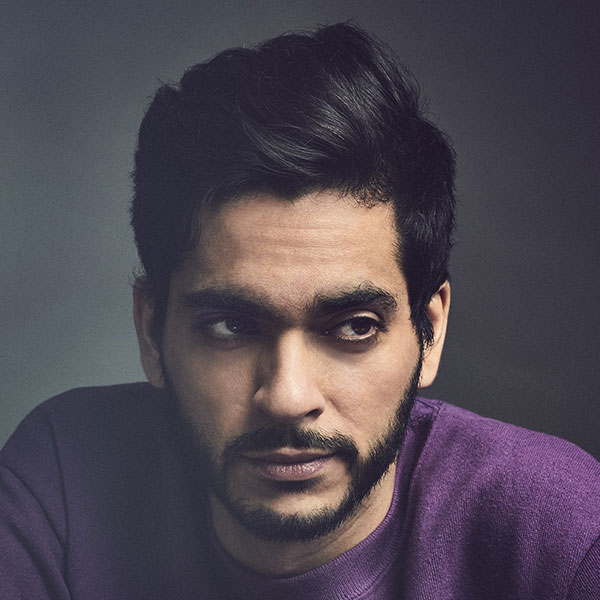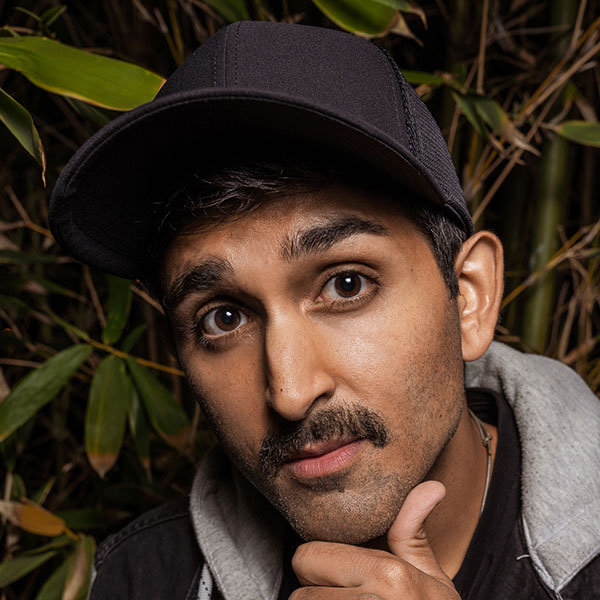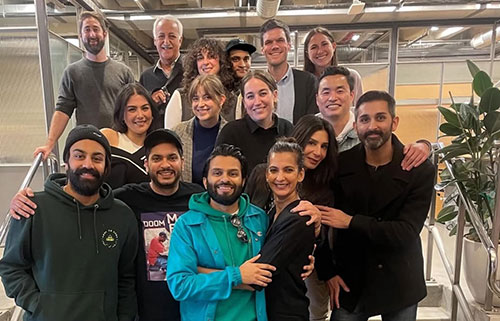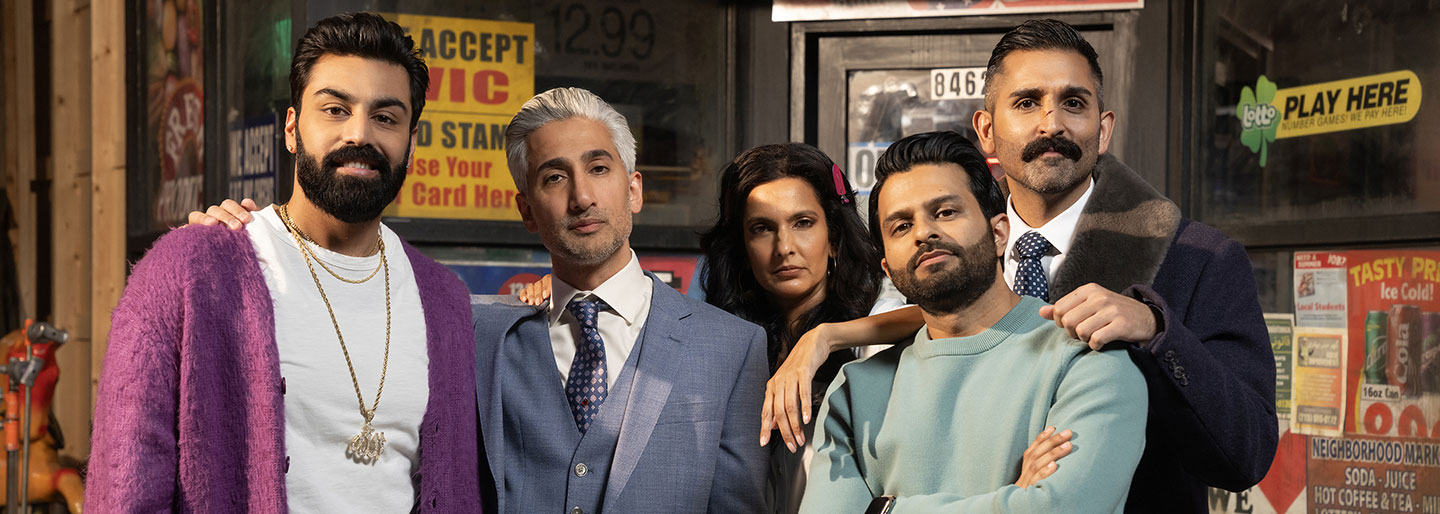When Pakistani American writer Abdullah Saeed made the rounds with his Deli Boys pilot, a dozen meetings resulted in what he describes as a dozen “soft” passes: “We like it, but we’re not going to make it.”
Then writer-producer Jenni Konner saw a series in Saeed’s script about a pair of over-indulged first generation Pakistani American brothers—stoner layabout Raj, and Mir, an earnest overachiever with a business degree. Unexpectedly, their wealthy father is killed by a golf ball, and the grieving pair inherit his until now secret cocaine-smuggling empire, fronted by a convenience store chain. As the hapless brothers find themselves entangled in a life of bloody crime, their badass Aunty Lucky and sinister Uncle Ahmed alternately mentor and undermine them.
 Abdullah Saeed. Photo by Jai Lennard.
Abdullah Saeed. Photo by Jai Lennard. Saeed, onetime producer and host of VICE Media’s Bong Appétit cannabis food documentary, wrote Deli Boys as a sample in 2019. Instead of avoiding stereotypes, he embraced them, both for comic effect and to “re-own” them.
“I’m taking these guys who are safely and happily outside of the convenience store, and I did all kinds of acrobatics to get them into a convenience store and keep them there,” Saeed says. “It’s part of how we’ve earned our livings as a diaspora. So I’m proud of it.”
And when he planned his writers’ room, he anticipated hiring as many Pakistani writers as possible: “Of course, with a somewhat limited pool, we expanded our lens.”
The result: Kyle Lau is Chinese American; Feraz Ozel is Pakistani American; Mehar Sethi is of Indian heritage; SNL alumna Sudi Green is Iranian American as is Nikki Kashani; and Ekaterina Vladimirova is of Russian-Uzbek background, creating a writing staff that revels in its inclusivity.
“Every step of the way, we were trying to include voices that aren’t normally heard, and get perspectives that aren’t normally taken into account,” says story editor Ozel. “Something about the shared experiences of working through Hollywood with our backgrounds, and trying to get opportunities, made us able to see ourselves in the project a little bit more, and value it that much more.”
 Feraz Ozel. Photo by Matt Misisco.
Feraz Ozel. Photo by Matt Misisco.Lucky Strike
When Saeed and Konner first took meetings, Netflix, F/X, Peacock, and Hulu turned the series down. Then Disney’s Onyx Collective gave it a greenlight. Back it went to Hulu, where its head-spinning cuts, split screens, dark comedy, and choreographed violence made an immediate gory splash.
Though Saeed had envisioned his series as having a Barry or Silicon Valley pace, its breakneck tone evolved in the room, and later, he says, through Konner’s post-production wizardry. But six weeks into pre-production, the 2023 strike began. Vladimirova was Konner’s assistant before Konner promoted her to writer’s assistant on Single Drunk Female. Kashani had been staffed on Deli Boys only two months into the 2023 Disney Entertainment Television Writing Program that supports emerging and multicultural writers. Both had just received their WGAW membership cards. With the rest of the staff, they took to the picket line.
“It was difficult, of course, but it was also really refreshing to see the leadership coming together and really trying to take a stand for all levels, all writers. It felt empowering to be a part of that community,” says Vladimirova.
Co-EP Mehar Sethi, who has written for Bojack Horseman and It’s Always Sunny in Philadelphia, says taking time away from writing during the strike indirectly benefited the series.
“We tore up most of what we had done before,” he remembers. “Not tore up, but we accelerated things. With nearly five months of just kind of twiddling your thumbs and staring into space, you come back and you’re like, Oh, what we thought was a good idea doesn’t make sense. And what would be a good episode 8 should actually be episode 3.”
Unafraid in the Room
All writers participated in every episode and every writer received a credit: “Also,” Saeed says, “everyone had jokes from their earliest drafts that made it into the final script.”

It’s just a show about awesome characters doing crazy shit. We are not spokespeople for our race.
- Feraz Ozel
With less experienced Vladimirova and Kashani “punching above their weight,” according to showrunner Michelle Nader [see 3rd & Fairfax podcast], the two were given episode 8.
“The hierarchy of the room mattered less because everyone’s voices could be heard,” Vladimirova says. “It was a super collaborative experience.”
On Deli Boys, recalls Kashani, she felt freed from any inhibitions that had affected her previously as the only Middle Eastern writer in the room.
“You can check that sort of fear at the door: the fear of being judged,” she says. “It just felt like such a specific world that I could infuse some of my own stories into, growing up first generation. There was so much shared experience, and then we all brought different flavors and different colors.”
 The Deli Boys writing staff.
The Deli Boys writing staff.Says Ozel, “We had so much fun balancing the tension with the jokes, and being able to flip back and forth between heart and suspense, and action, and just all out funny, and sometimes even slapstick wackiness.”
An actor and stand-up comedian, Ozel’s writing career took off after he took part in the Disney program in 2020. Amid the current targeting of DEI initiatives, he hopes people can still recognize the importance of offering opportunities to those from varied backgrounds who, as he puts it, have been “clawing” their way up for years.
“To get into these programs, you have to be exceptional,” says Ozel, who was also involved in the early stage of the recently formed South Asian Writers Committee. “We surprised ourselves with how many of us there were, and how many of us felt like we wanted to band together and try to make more things happen.”
But showcasing diversity, or selling audiences a burnished image of South Asian characters was never the Deli Boys goal. “It’s just a show about awesome characters doing crazy shit,” Ozel adds. “We are not spokespeople for our race.”
“Go for it!”
South Asian themes and attitudes are the foundation of the show, of course, but they’re there to advance laughs: Americanized Raj and Mir bow at the wrong time during Muslim prayer; an arranged marriage happens, but to facilitate drug-running; gray-haired Uncle Ahmed blames Indians for robbing Pakistanis during the 1947 political Partition with India, and the brothers accuse him of “racist old-world thinking.” But Indians killed the boys’ great-grandma, counters Ahmed. “No, she died in America from nursing home neglect,” says Raj.
“One of my favorite parts of the show is that you’re looking at the second level of the immigrant experience of people who are Americans,” says Vladimirova, “but still have a level of connection to their family’s culture.”
More lines poke fun at American racism: “Put on the face we normally do when we talk to white strangers so we don’t sketch them out because we’re Brown guys with facial hair,” Mir advises Raj before the brothers assume ingratiating grins.
Sethi, who came up with jokes about the politically sensitive Partition, says he never felt the need to self-censor because Saeed, Konner, Nader, and Onyx encouraged the writers to take risks.
“It was a real joy to go at certain subjects that are—I don't know if they’re taboo—but they’re just unexplored,” he says. “I don’t think we could have done as much fun stuff as we wanted to had we not had the amount of diversity. Beyond racially diverse, it was also a very gender diverse room. I have been in diverse rooms, but nothing even remotely like this.”






